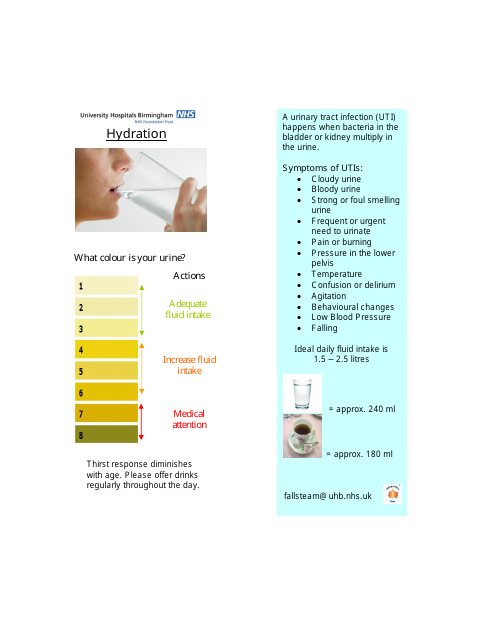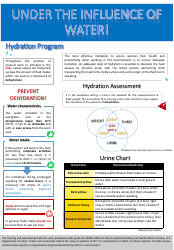Hydration Chart
A hydration chart is used to track and monitor the amount of water intake throughout the day. It helps individuals ensure they are staying adequately hydrated for good health.
FAQ
Q: What is a hydration chart?
A: A hydration chart is a visual tool that helps you track and monitor your fluid intake.
Q: Why is it important to stay hydrated?
A: Staying hydrated is important for maintaining overall health and well-being. It helps regulate body temperature, supports digestion, flushes out toxins, and keeps your organs functioning properly.
Q: What are the benefits of using a hydration chart?
A: Using a hydration chart can help you stay accountable and ensure that you are drinking enough fluids throughout the day. It can also help identify patterns and track improvements in your hydration habits.
Q: How much water should I drink in a day?
A: The recommended daily water intake varies, but a general guideline is to drink at least eight 8-ounce glasses of water, which equals about 2 liters or half a gallon.
Q: Are there any other sources of hydration besides water?
A: Yes, besides water, you can also hydrate yourself with other beverages such as herbal tea, fruit-infused water, milk, and unsweetened fruit juices. However, it's important to limit intake of sugary or caffeinated drinks.
Q: Who can benefit from using a hydration chart?
A: Anyone can benefit from using a hydration chart, especially those who struggle with staying hydrated or have specific health conditions that require monitoring fluid intake.
Q: Are there any risks of overhydrating?
A: While rare, overhydration can be a concern. It's important to listen to your body's signals and not force yourself to drink excessive amounts of fluids. If you have any health conditions, it's always a good idea to consult with your healthcare provider.
Q: What are some signs of dehydration?
A: Some common signs of dehydration include dry mouth, thirst, dark yellow urine, fatigue, dizziness, and decreased urine output.
Q: Can certain medical conditions increase the need for hydration?
A: Yes, certain medical conditions such as diabetes, kidney disease, and gastrointestinal disorders may increase the need for hydration. It's important to follow any specific guidelines provided by your healthcare provider.


